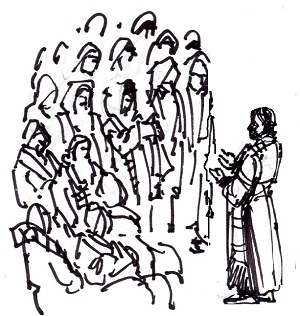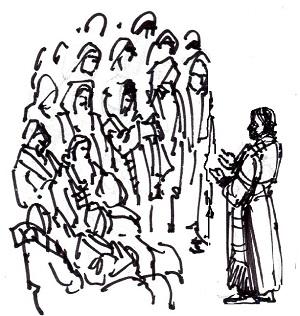

“Where did this man get all this?” (Matt 13:55).
Context is important. Matthew puts the story of Jesus’ return to his hometown at the end of Chapter 13, immediately following his many parables about the Kingdom of God. Jesus goes from success and public acclaim as a storyteller and miracle worker to rejection by his own family and neighbors. Why this sudden fall from grace?
The story suggests that the hometown crowd was genuinely mystified at the apparent change in Jesus from the local carpenter whose performance and personality up to that point had not shown any exceptional traits or abilities. Everyone knew Jesus. He had grown up in Nazareth surrounded by his extended family. He was one of them, an ordinary man in a backwoods village in the hill country of Galilee, a place already pegged by sayings like the one heard in Judea: “What good can come from Nazareth?”
The scene ends with Jesus uttering another saying about prophets being honored everywhere except in their own towns and houses. The story confirms a deeper theme in Matthew about rejection. The “messianic secret” is that the one rejected is God’s servant, the Christ, the messiah. Why did people turn their backs on God’s messenger? Why did someone who could speak so graciously and act with such compassion end up being rejected, beginning with his own hometown but repeatedly as his ministry reached Jerusalem?
GK Chesterton once said that Christianity was not tried and found wanting, but found difficult and so never tried. The Good News required a revolution of the heart followed by real changes in society, the restoration of justice, a cessation of violence and an end to division and discrimination against the poor. Once people got past the intriguing parables and extraordinary signs Jesus was offering, they realized that he was asking everyone to change their ways, to submit to a total conversion that would challenge their economic interests and social privileges.
Once people understood what Jesus was saying in Nazareth when, in Luke’s account, he quoted Isaiah’s vision of the kind of world God wanted, they turned away. What politician could get elected today who called for justice for the poor, the release of prisoners, relief for the oppressed, a year of favor in which all debts were cancelled? It made sense that when Jesus claimed that this prophecy was coming true in their hearing, his own hometown rose up to throw him over a cliff. “Who do you think you are, telling us that this is what God really wants?”
The Gospel creates a crisis when it is fully grasped. So we turn down the volume and adjust the timetable and intensity of its call from radical to reasonable, from must to maybe, from now to later. Matthew was cutting to the chase. Only when we understand why Jesus was rejected will we know the true cost of discipleship.
Advertisement








